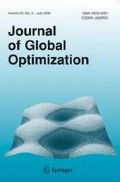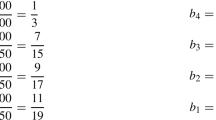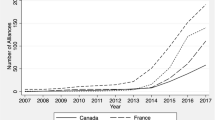Abstract
We study a differential game of information security investment and information sharing in a market consisting of n complementary firms. Two game approaches, the non-cooperative game and the totally cooperative game, are employed to investigate the steady state strategy of each firm. Under certain conditions, a unique steady state can be obtained for both games. We find that the steady state security investment and information sharing level are not always less in the non-cooperative game than that in the totally cooperative game. In addition, some theoretical analyses are made on the impacts of the complementarity degree and industry size on firms’ steady state strategies for both games. Finally, some numerical experiments are conducted to give some insights related to the instantaneous profit in the steady state. It can be found that a firm will obtain more instantaneous profit in the steady state of the totally cooperative game than that of the non-cooperative game, which emphasizes the importance of coordinating strategies. The effects of the complementarity degree and industry size on the instantaneous profits in the steady state are also obtained through the numerical experiment results.












Similar content being viewed by others
References
Armerding, T.: The 15 worst data security breaches of the 21st Century. http://www.csoonline.com/article/2130877/data-protection/data-protection-the-15-worst-data-security-breaches-of-the-21st-century.html?page=3 (2015)
Huang, C.D., Hu, Q., Behara, R.S.: An economic analysis of the optimal information security investment in the case of a risk-averse firm. Int. J. Prod. Econ. 114, 793–804 (2008)
Lelarge, M.: Coordination in network security games: a monotone comparative statics approach. IEEE J. Sel. Areas Commun. 30, 2210–2219 (2012)
Huang, C.D., Behara, R.S.: Economics of information security investment in the case of concurrent heterogeneous attacks with budget constraints. Int. J. Prod. Econ. 141, 255–268 (2013)
Chai, S., Kim, M., Rao, H.R.: Firms’ information security investment decisions: stock market evidence of investors’ behavior. Decis. Support Syst. 50, 651–661 (2011)
Bandyopadhyay, T., Jacob, V., Raghunathan, S.: Information security in networked supply chains: impact of network vulnerability and supply chain integration on incentives to invest. Inf. Technol. Manag. 11, 7–23 (2010)
Eisenga, A., Jones, T.L., Rodriguez, W.: Investing in IT security: how to determine the maximum threshold. Int. J. Inf. Secur. Priv. 6, 75–87 (2012)
Wu, Y., Feng, G., Wang, N., Liang, H.: Game of information security investment: impact of attack types and network vulnerability. Expert Syst. Appl. 42, 6132–6146 (2015)
Gao, X., Zhong, W., Mei, S.: Security investment and information sharing under an alternative security breach probability function. Inf. Syst. Front. 17, 423–438 (2015)
Qian, X., Liu, X., Pei, J., Pardalos, P.M., Liu, L.: A game-theoretic analysis of information security investment for multiple firms in a network. J. Oper. Res. Soc. 68, 1290–1305 (2017)
Gao, X., Zhong, W.: Economic incentives in security information sharing: the effects of market structures. Inf. Technol. Manag. 17, 361–377 (2016)
Gal-Or, E., Ghose, A.: The economic incentives for sharing security information. Inf. Syst. Res. 16, 186–208 (2005)
Gao, X., Zhong, W., Mei, S.: A differential game approach to information security investment under hackers’ knowledge dissemination. Oper. Res. Lett. 41, 421–425 (2013)
Marte, J.: Are data breaches creating smarter consumers? http://www.washingtonpost.com/news/get-there/wp/2014/10/20/are-data-breaches-creating-better-consumers/ (2014)
Cellini, R., Lambertini, L.: Advertising with spillover effects in a differential oligopoly game with differentiated goods. CEJOR 11, 409–423 (2003)
Cellini, R., Lambertini, L.: A differential game approach to investment in product differentiation. J. Econ. Dyn. Control 27, 51–62 (2002)
Kumar, A., Tan, Y.: Demand effects of joint product advertising in online videos. Manag. Sci. 61, 1921–1937 (2015)
Tan, Y., Carrillo, J., Cheng, H.K.: The agency model for digital goods. Decis. Sci. 4, 628–660 (2016)
Tan, Y., Carrillo, J.: Strategic analysis of the agency model for digital goods. Prod. Oper. Manag. 26, 724–741 (2017)
Mukhopadhyay, S.K., Yue, X., Zhu, X.: A Stackelberg model of pricing of complementary goods under information asymmetry. Int. J. Prod. Econ. 134, 424–433 (2011)
Liu, D., Ji, Y., Mookerjee, V.: Knowledge sharing and investment decisions in information security. Decis. Support Syst. 52, 95–107 (2011)
Gordon, L.A., Loeb, M., Lucyshyn, W.: Sharing information on computer systems security: an economic analysis. J. Account. Public Policy 22, 461–485 (2003)
Hausken, K.: Information sharing among firms and cyber attacks. J. Account. Public Policy 26, 639–688 (2007)
Gao, X., Zhong, W., Mei, S.: A game-theoretic analysis of information sharing and security investment for complementary firms. J. Oper. Res. Soc. 65, 1682–1691 (2014)
Yan, R., Bandyopadhyay, S.: The profit benefits of bundle pricing of complementary products. J. Retail. Consum. Serv. 18, 355–361 (2011)
Acknowledgements
This work is supported by the National Natural Science Foundation of China (Nos. 71231004, 71601065, 71690235, 71690230, 71501058), and Innovative Research Groups of the National Natural Science Foundation of China (71521001), the Humanities and Social Sciences Foundation of the Chinese Ministry of Education (No. 15YJC630097), Anhui Province Natural Science Foundation (No. 1608085QG167), and the Science and Technology Project of Zhejiang Province (No. 2017C31069). Panos M. Pardalos is partially supported by the project of “Distinguished International Professor by the Chinese Ministry of Education” (MS2014HFGY026).
Author information
Authors and Affiliations
Corresponding authors
Rights and permissions
About this article
Cite this article
Liu, X., Qian, X., Pei, J. et al. Security investment and information sharing in the market of complementary firms: impact of complementarity degree and industry size. J Glob Optim 70, 413–436 (2018). https://doi.org/10.1007/s10898-017-0585-y
Received:
Accepted:
Published:
Issue Date:
DOI: https://doi.org/10.1007/s10898-017-0585-y




